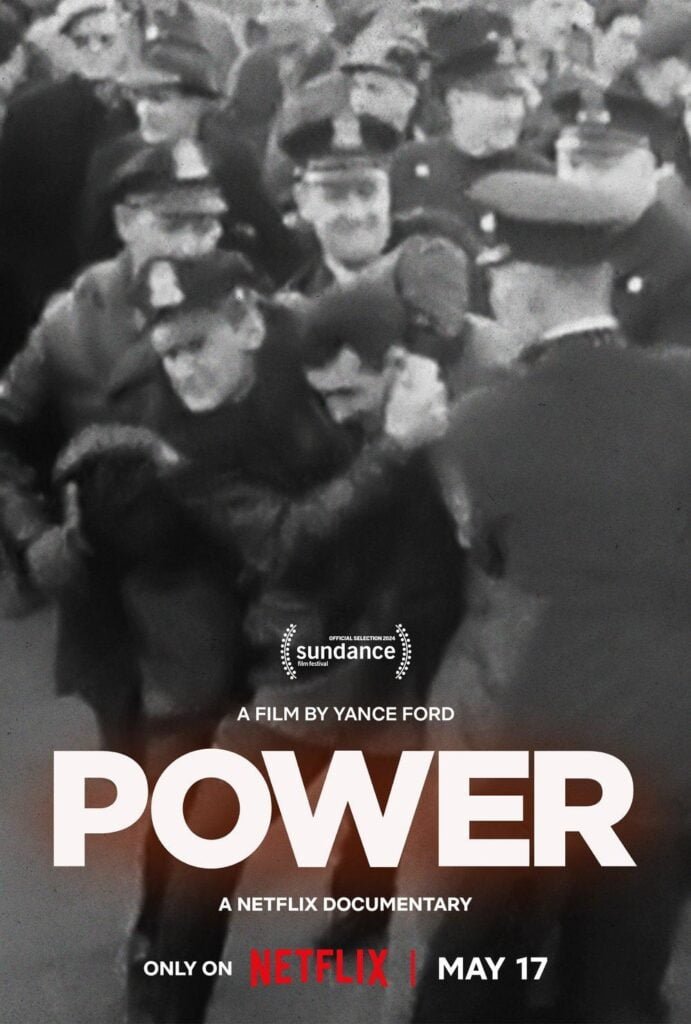Power Review

It is a well known fact that police brutality never seems to leave the media. There are too many instances, too many stories from around the country pointing to a larger abuse of state-sanctioned power. Some headlines bubble up to national attention, even those that don’t will leave marks on the community where it happened. In “Power,” documentary maker Yance Ford pauses today’s top stories for a moment of reflection to ask: how did we get here?
With his painfully personal investigation into his brother’s murder in “Strong Island,” Ford took an approach that was much more distant than this one. This time, he’s off-screen, but very much present guiding us through this multifaceted issue with his narration. As a parade of academics, journalists, and police officers past and present unpacks images that have become all too familiar to us, Ford uses their voices to show just how deeply rooted in our nation’s history the problem is tracing the origins of policing back to when white settlers had the indigenous population overseen by the military in the 19th century; when Black people were monitored by slave patrols; when deputized groups fought back striking lower class workers.
But then there are these tangents so many small moments throughout history that led us here. The documentary shows how wartime influenced police tactics; how after slavery ended Black Codes gave white citizens the power to arrest their Black neighbors; why professors believe different philosophical and sociological reasons were used as justification for treating Black communities worse than other ones; how white privilege played a role in allowing once persecuted populations like Irish and Italian Americans move up in society by joining those who terrorized their communities; what happens when you use violence as a tool for control and it tips over into fascism that could threaten our democracy.
In addition to scholars and experts from various disciplines being interviewed throughout “Power,” Ford also follows Charlie Adams a Black member of Minnesota’s police force who is wrestling with his profession’s shortcomings and has been affected by the violence he’s witnessed while on duty. Adams provides a personal perspective on this topic that I haven’t seen covered elsewhere. He gives a measured testimony, fluctuating between emotionally recounting stories of young children losing their life to gun violence and matter of-factly explaining the history behind his line of work. Through Adams we learn about how the justice system fails Black children first hand, and what supporting other Black officers on the force has cost him professionally but he still believes in remaining in hopes of seeing them realized someday.
All through “Power,” Ford asks his audience and some of the guest lecturers profound questions. Whenever one of the speakers says “we” allowed police to get away with brutality, Ford pushes back, asking who is ‘we’? Our present-day selves didn’t sign off on centuries of inequality it’s something we’ve inherited. In another section, Ford blurs or blacks out some of the more fatal police footage. Do you need to see someone die in order to believe they’re dead? In another moment, he juxtaposes a clip of a 1950s-style police officer hugging his family with audio of an incident of police brutality playing in the background, creating a jarring cognitive dissonance between the images we’ve seen of police in the media versus the images of brutality they don’t want us to see.
The documentary is filled with archival material that supports the speakers’ insights and underscores their research. He includes clips from propaganda like the Ben Gazzara-narrated “The Police Film” and footage from now-public riot-squashing drills that form the basis of another chilling documentary called “Riotsville, U.S.A.” He goes as far back as photographs from the Spanish American War, silent films about criminals and countless newsreels to show how deep this thing goes. And he brings it up right next to present-day surveillance those eerie eye-in-the-sky views that allow for even more unfettered access into our lives signaling what might be coming down the pipeline.
“Power” isn’t trying so much as putting police brutality on trial. It feels like a primer, a crash course for those who didn’t know and more food for thought for those who did know about its dangers and harrowing legacy in this country. The documentary falls into the recent trap trend trendtrend trend trend o f breaking up breakingbreak ingupthe narrative intointo chapters , sometimes titled like “counter insurgency” or “violence work” to highlight keywords in an upcoming speaker’s quote as if it were outline notes from a class lecture. It’s unnecessary because Ford smoothly structures the flow from one subtopic to the next, quickly explaining things like qualified immunity, the political groundswell that ballooned police funding and the failures of policies like Stop and Frisk. It’s a heavy and big immense topic, one that Ford takes apart in pieces so this audience can hear learn something new about this centuries-old issue.
Watch Power For Free On Gomovies.
.jpg?w=1024&resize=1024,1024&ssl=1)
.jpg?w=1024&resize=1024,1024&ssl=1)
.jpg?w=1024&resize=1024,1024&ssl=1)
.jpg?w=1024&resize=1024,1024&ssl=1)
.webp?w=1024&resize=1024,1024&ssl=1)
.jpg?w=1024&resize=1024,1024&ssl=1)
.jpg?w=1024&resize=1024,1024&ssl=1)
.jpg?w=1024&resize=1024,1024&ssl=1)